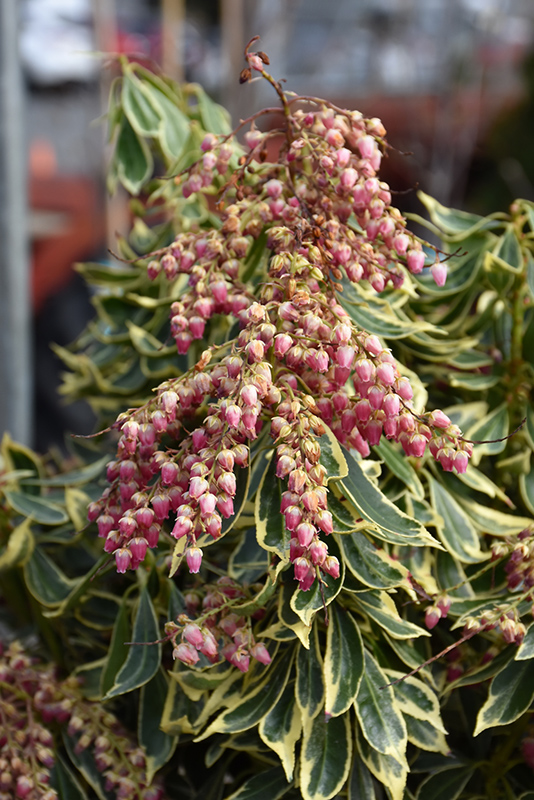Find Plants
Passion Frost Japanese Pieris
Pieris japonica 'Ralto'
Height: 5 feet
Spread: 3 feet
Sunlight:
![]()
![]()
Hardiness Zone: 5
Other Names: Lily of the Valley Shrub, Japanese Andromeda
Group/Class: Passion Party
Description:
A highly ornamental broadleaf evergreen shrub, prized for its showy chains of purplish-red bell-shaped flowers and cream-yellow edged foliage, a dense and compact variety; performs best in moist, organic and acidic soils
Ornamental Features
Passion Frost Japanese Pieris features dainty chains of antique red bell-shaped flowers hanging below the branches in early spring. It has attractive dark green foliage edged in buttery yellow. The glossy narrow leaves are highly ornamental and remain dark green throughout the winter.
Landscape Attributes
Passion Frost Japanese Pieris is a dense multi-stemmed evergreen shrub with an upright spreading habit of growth. Its average texture blends into the landscape, but can be balanced by one or two finer or coarser trees or shrubs for an effective composition.
This shrub will require occasional maintenance and upkeep, and should only be pruned after flowering to avoid removing any of the current season's flowers. Deer don't particularly care for this plant and will usually leave it alone in favor of tastier treats. It has no significant negative characteristics.
Passion Frost Japanese Pieris is recommended for the following landscape applications;
- Accent
- Mass Planting
- Hedges/Screening
- General Garden Use
Planting & Growing
Passion Frost Japanese Pieris will grow to be about 5 feet tall at maturity, with a spread of 3 feet. It tends to fill out right to the ground and therefore doesn't necessarily require facer plants in front, and is suitable for planting under power lines. It grows at a slow rate, and under ideal conditions can be expected to live for 40 years or more.
This shrub does best in full sun to partial shade. It requires an evenly moist well-drained soil for optimal growth, but will die in standing water. It is very fussy about its soil conditions and must have rich, acidic soils to ensure success, and is subject to chlorosis (yellowing) of the foliage in alkaline soils. It is somewhat tolerant of urban pollution, and will benefit from being planted in a relatively sheltered location. Consider applying a thick mulch around the root zone in winter to protect it in exposed locations or colder microclimates. This is a selected variety of a species not originally from North America, and parts of it are known to be toxic to humans and animals, so care should be exercised in planting it around children and pets.
Disclaimer - This Plant Finder tool is an online resource representing many of the varieties that we carry over the course of the season, and is intended for informational purposes only. Inventory varies seasonally, so we cannot guarantee that every plant will be in stock at all times - please contact the store directly for availability. It does not include our entire inventory of plants, so be sure to visit our store to see varieties that may not be represented on this list.


